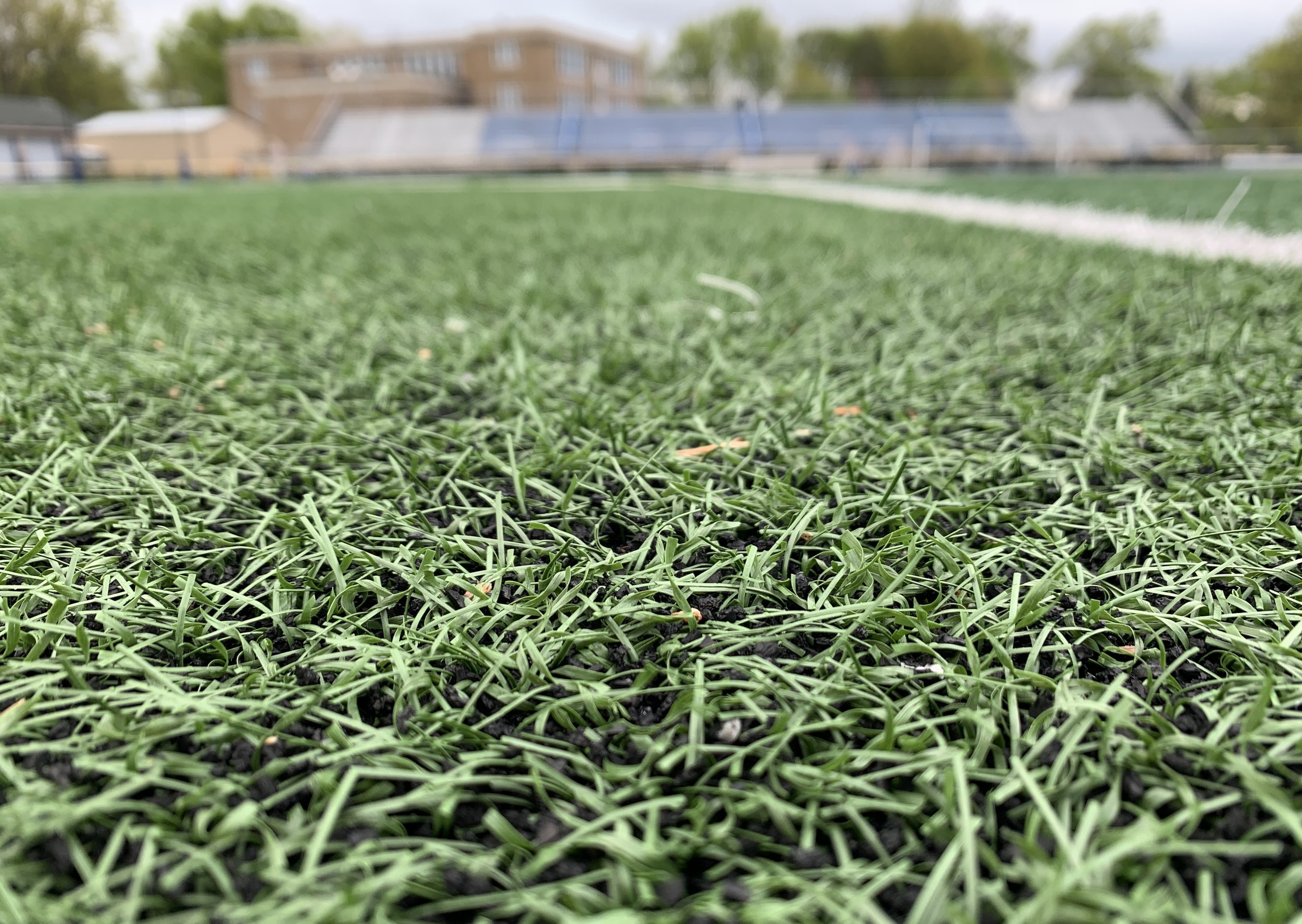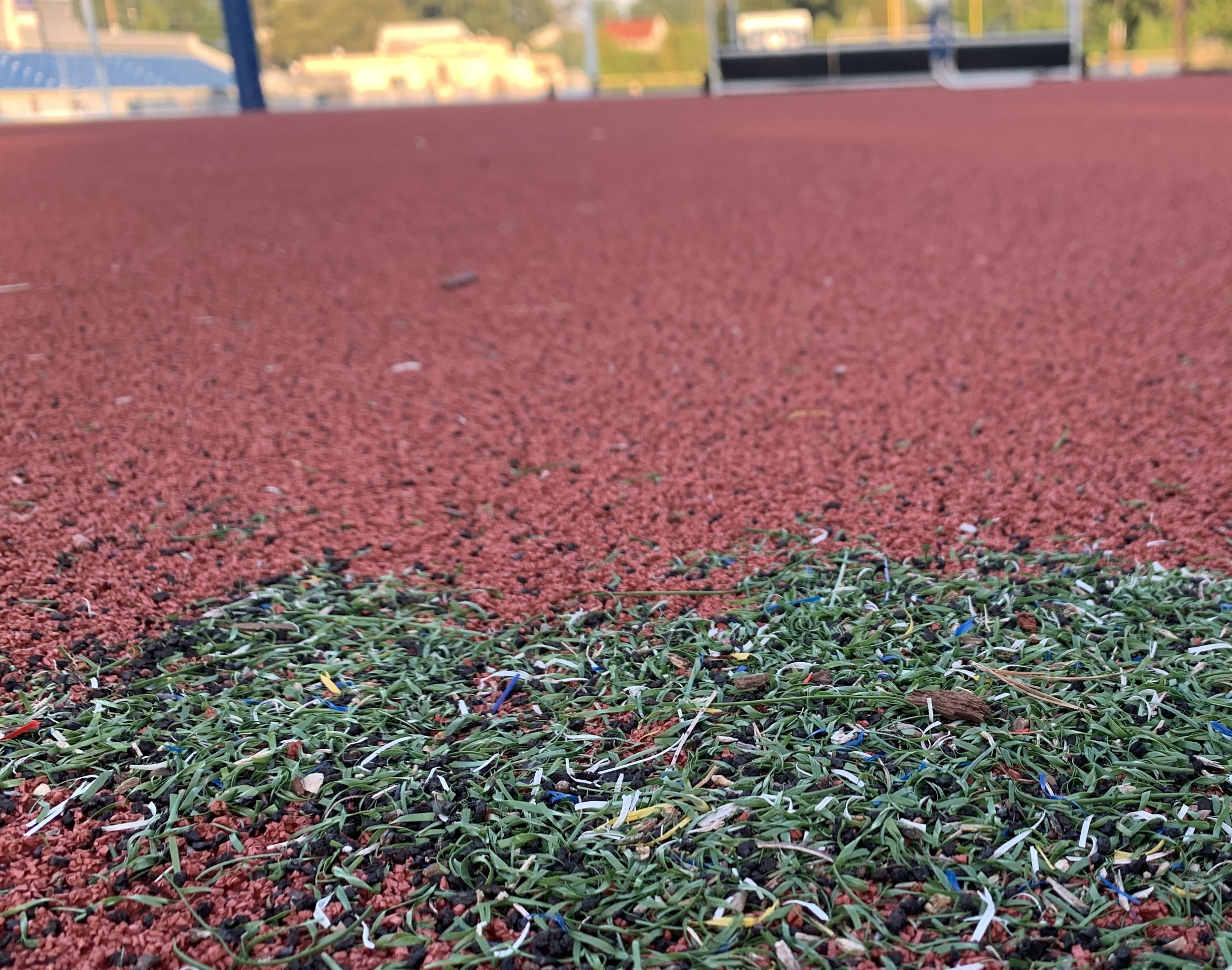💧Preventing 6 Acres of Toxic Plastic Grass from Poisoning the Rahway River Watershed & Schoolyard in New Jersey ☣️
Local advocates scored a major victory against plastic pollution on Tuesday, November 7, 2023 when voters in Westfield, New Jersey rejected the hefty $11.8 million bond measure needed to fund the installation of six acres of fake plastic grass, while voters in neighboring Scotch Plains rejected a $3.8 million measure to support an installation in Brookside Park.
Jean Lehmberg, co-leader of Westfield Citizens For Responsible Athletic Fields (CRAFD) led the charge in Westfield alongside co-leads Gregg Lehmberg and Jean Crawford and the campaign was further supported by Beyond Plastics volunteer and CRAFD member Susan Goodman.
Jean became involved with Citizens for Responsible Athletic Field Development when it formed in July 2021. When she reached out to Third Act! for help in advocating against artificial turf she was steered to the Beyond Plastics website and immediately signed up for the Beyond Plastics Pollution online course offered through Bennington College and taught by Judith Enck. Although they are both longtime residents of Westfield, Jean and Susan fortuitously met in class in 2022.
Westfield is home to roughly 30,000 residents. The commuters rail line runs through the middle of the town, which has led to residents often referring to their home as being on the “northside” or the “southside”. With Sue on the northside, she hadn’t heard of the southside Edison Field Project, but once she found out about CRAFD in Judith’s class, she committed to the campaign bringing fresh energy and enthusiasm to the group who had been fighting against the Edison School Multipurpose Fields Project for well over a year.
The Edison Field Project (EFP) was a plan that began to move forward in 2021 after the Town Council voted to authorize the Mayor to sign a Letter of Intent to explore a shared service agreement with the Westfield Board of Education for a proposed multipurpose fields project at Edison Intermediate School. The EFP plan included replacing the majority of the natural grass schoolyard behind Edison Intermediate School with nearly six acres of artificial turf.
Close up of artificial turf (a.k.a. plastic grass) at Kehler Stadium.
As a former pediatric oncology nurse, Sue delivered passionate testimony at a Westfield town council meeting, to make the connection between petrochemical products and public health:
“I want to tell every one of you what it is like to take care of a child dying of cancer. What it does to the family, what it does to the staff, what it does to the siblings. You want children to have more home time, more homework time, more downtime, more family time? Well, that all gets taken away… And I know what it’s like to sit there after the parents go home because they have other things to do. And I stay over extra hours after I sign out. And I hold these kids' hands because they’re afraid at night. And they’re scared and they could be four and they could be five and they could be sixteen. I saw them die. I saw them go through surgeries. I saw them go through chemo…So you put that artificial grass in. You put in those plastics…I know what you’re putting in those kids’ lungs. I know what you’re putting in those kids’ bloodstreams. I know what’s going into their tissues. And if it doesn’t happen right away, it will be when they’re twenty-five…Why do you think that there’s so [many] problems with people having to have [fertility treatments]? Why do you think the breast cancer rate is increasing even though we’re throwing more drugs into people’s bodies to save them? … I worked with cancer and I know how awful it is and how disgusting it is. And you want to put more playable hours and you want to put these poor little babies' bodies on that?”
CRAFD volunteers visited nearly every household in Westfield leading up to the election, leaving them with this flyer and it’s this simple educational tactic that Jean credits with much of the campaign’s success. By rejecting an $11.8 million bond referendum to fund the project, Westfield voters protected the health and safety of the students and the local environment. If passed, the nearly 800 middle school students would’ve lost nearly all natural grass for lunch, recess and physical education classes.
Snapshot of the top of the two-page flier advocates left at homes leading up to the vote. Click here to view the full flier.
New Jersey is the first state in the nation to include climate change across content areas. The New Jersey Department of Education website states, “The New Jersey Student Learning Standards (NJSLS) are designed to prepare students to understand how and why climate change happens, the impact it has on our local and global communities and to act in informed and sustainable ways.”
If the EFP had moved forward, teachers would have been faced with the incongruous task of teaching students about climate change while students were recreating and playing sports on plastic grass which contributes to the urban heat island effect, sheds microplastics, and contains an array of toxic chemicals that could leach into groundwater near the Robinson’s Branch of the Rahway River.
A small sampling of microplastic pollution from artificial turf at Kehler Stadium.
In nearby Scotch Plains, residents also voted down, by a significant margin, a bond ordinance authorizing the appropriation of $3.8 million in town funds to finance a large synthetic turf installation in Brookside Park. This effort was led by Susan Dazzo, a Beyond Plastics Pollution Fall 2023 alumni, along with other dedicated residents who volunteered for the Friends of Brookside Park effort.
Gregg summed up what many worked so hard to accomplish saying, “Over the past two plus years, CRAFD has discovered and shared a great deal of information about modern design and organic maintenance techniques that enable natural grass athletic fields to withstand sports activities and grow more resilient. It is our hope that the Town and Board of Education will be receptive to using that information to improve our existing grass fields. CRAFD’s goal has always been to make our natural grass fields safer and more durable for longer hours of youth sports activity while keeping the environment healthier for everyone.”
This was a win especially for the main users of turf — kids. Children are especially vulnerable to the effects of toxic chemicals because of their rapidly developing organ systems and immature detoxification systems. They also have greater hand-to-mouth exposure to environmental contaminants compared to adults.
Synthetic turf also exposes users to a range of toxic chemicals including benzene, styrene, PFAS and phthalates. CRAFD documented plastic grass reaching temperatures of 145°F on a 92°F day. These extreme surface temps create the risk of skin burns and contribute to urban heat islands, all while perpetuating fossil fuel’s plan B.
The fight against synthetic turf is a local one. To help you in your campaign we’ve created a Model Synthetic Turf Ban if your locality has the political will for it and a Model Synthetic Turf Moratorium if not. Reach out to christinadubin@bennington.edu if you’d like to connect with Jean of CRAFD regarding her experience advocating for natural grass athletic fields In Westfield, NJ and to Beyond Plastics Affiliate Safe and Healthy Playing Fields for resources and guidance on your local campaign: SHPFC.contact@gmail.com. Check out Osborne Organics for resources on organic (natural) turf management.
The lovely, non-toxic, natural grass playing fields at Edison Intermediate School.
RESOURCES
Fact Sheet: View or download our fact sheet on artificial or synthetic turf here.
We’ve created some sample language for moratoriums and a ban that you can use to attempt to stop the installation of artificial turf (aka synthetic turf or plastic grass) in your town, city, county, or state below.






